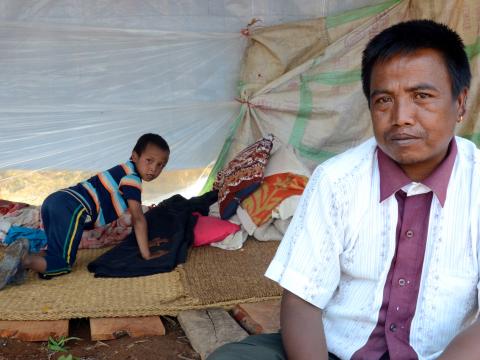Families worried as monsoon season arrives

Babu Tamang shares a temporary shelter with another family on farmland in Changunarayan. Their houses were damaged during the earthquake.
Now they are worried about the coming monsoon season.
Apart from the critical need for proper shelter, they are both farmers making the situation even more difficult – their wheat crop is ready for harvest now.
Babu says, “My house is cracked and not usable anymore. Soon we will have our crops and I wonder where I will keep them. We were supposed to start harvesting, but when we have not even been able to make proper arrangements for ourselves what can we do as we do not have space or money?”
Nauku Kumari, Babu’s mother, shows her damaged house, including the attic where she normally stores the grain. She doesn’t want anyone to go in because she fears that it may collapse.
“I was very small during the 1990 B.S. [16 January 1934] earthquake but I still remember that day. But this recent earthquake was very dangerous. Now my house has several cracks and we cannot stay inside. At this age I am having to go through these troubles which I never expected,” she utters solemnly.
Many people in Nepal have serious concerns because of the monsoon season, as it will add to their existing difficulties.
Families are not sure what to do about their cracked houses because it takes money to demolish them and start over. Many houses are in a dangerous state, unfit for anyone to live in.
“We being so near to the city still have problems. I cannot imagine how people are coping in remote areas. We all survived and now we don’t have a place to stay, no food to eat, and we are not sure about our future,” says Babu. “I am worried about my children as how they will also cope in the coming days as my suffering is their suffering too.”
The coming rains are projected to add more concerns because of landslides, adding to the already earthquake cracked and damaged roads.
World Vision is working in this community. An initial distribution of blankets took place soon after the first earthquake, which was especially welcome for children who had been sleeping in the cold and with nothing much to keep them warm.